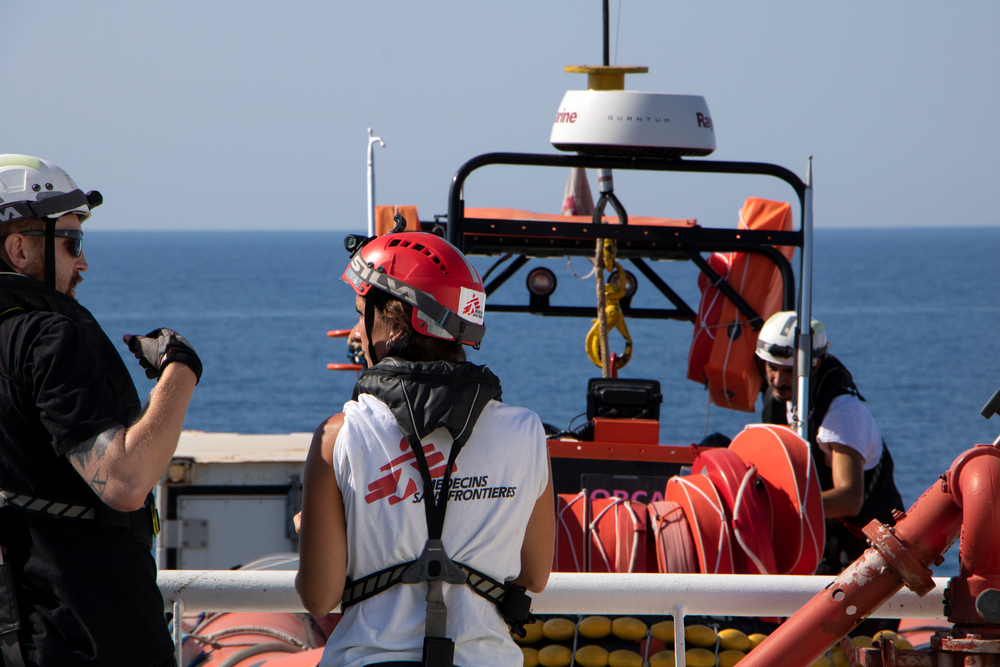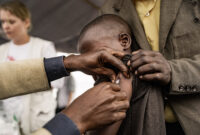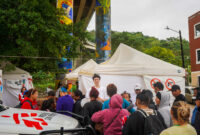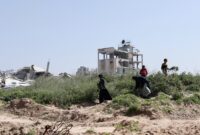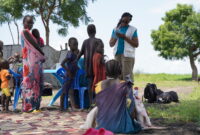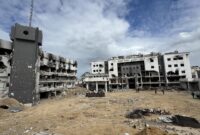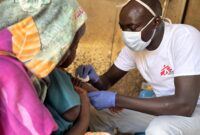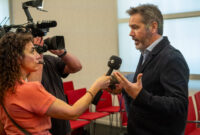SOS MEDITERRANEE, MSF and SEA-WATCH alert on the critical risk of more deaths in the central Mediterranean this summer in the absence of European state led search and rescue operations
In this summer season, SOS MEDITERRANEE, MSF and SEA-WATCH urgently call for the provision of European state-led search and rescue maritime assets in the central Mediterranean to prevent more deaths.
Within five days, Geo Barents, a search and rescue ship operated by Doctors Without Borders/Médecins Sans Frontières (MSF), and Ocean Viking a search and rescue ship chartered by SOS MEDITERRANEE in partnership with the International Federation of Red Cross and Red Crescent Societies (IFRC), rescued sixteen boats in distress. The week before, the Sea-Watch 3 was also able to rescue five boats in distress at sea with a total of 444 survivors. Without the presence of civil search and rescue assets in the central Mediterranean, the children, women and men rescued during these lifesaving operations would have been left to their fate in international waters off Libya, on the world deadliest sea migration route since 2014.
Undermining capacity
The disengagement of European maritime capacity from search and rescue in the central Mediterranean, as well as delays in assigning a place of safety for disembarkation have undermined the integrity and capacity of the search and rescue system and therefore the ability to save lives. Despite the fact that, as prescribed by maritime law, we systematically seek coordination for our operations, the Libyan maritime authorities almost never respond, neglecting their legal obligation to coordinate assistance. Furthermore, when they intervene and intercept boats in distress, Libyan maritime authorities systematically forcibly return the survivors to Libya, which cannot be considered as a place of safety according to the UN.

Meanwhile, despite the critical lack of adequate search and rescue assets in this stretch of the sea, people continue to flee Libya via the sea and risk their lives to seek safety. During summer, when weather conditions are the most favorable to attempt such a dangerous journey, departures from Libya are more frequent and a large search and rescue fleet is therefore required.
“Since the beginning of the summer season, our team has conducted three rescues at sea. Unfortunately, the first rescue ended tragically, with nearly 30 people missing and one woman who did not make it. The other two rescues have been very intense, with six rescues in twelve hours and eleven rescues in 72 hours, saving a total of 974 people. Due to the state of necessity, we currently have 659 people on board of the Geo Barents, which is above the vessel capacity. We kept receiving alerts that were left unanswered or spotting boats in distress from our bridge and it is our legal and moral duty not to let these people drown. Covering the void of the state-led search and rescue fleet is simply not enough given the needs and increasing capacity in the Central Mediterranean is more than necessary.“ explains Juan Matias Gil, MSF Search and Rescue Representative.
While Sea-Watch 3 disembarked 438 people in Taranto, Italy on July 30th, and Ocean Viking disembarked the 387 women, children and men rescued between July 24th and 25th in Salerno, Italy on August 1st, the Geo Barents is still waiting for a solution to be found for the survivors rescued up to seven days ago.
Delaying disembarkation
“Keeping survivors stranded at sea for days waiting to disembark in a place of safety is an additional violence imposed on already extremely vulnerable people. Survivors rescued by the Ocean Viking in the past six years have been recounting harrowing stories of violence and abuse to our teams. The last and only hope they carry is to manage to flee Libya, which they often call “hell on earth”, via the sea, regardless of the risks. The removal of adequate and competent European search and rescue services in international waters off Libya has proven to be deadly and ineffective in preventing dangerous crossings.” says Xavier Lauth, SOS MEDITERRANEE director of operations.

“While the European authorities are not willing to fulfill their duty to rescue people at sea, they are also delaying the disembarkation of rescued people by NGOs. This unnecessary waiting for days exhausts the rescued people: they have survived the Mediterranean, but instead of finding safety, they have to wait for days at the closed gates of Europe for their human rights to be respected.” says Mattea Weihe, SEA-WATCH spokesperson.
SOS MEDITERRANEE, MSF and SEA-WATCH demand that European member and associated states provide an adequate state-led dedicated and proactive search and rescue fleet in the Central Mediterranean, and a fast and adequate response to all distress calls, as well as a predictable disembarkation mechanism of survivors.
